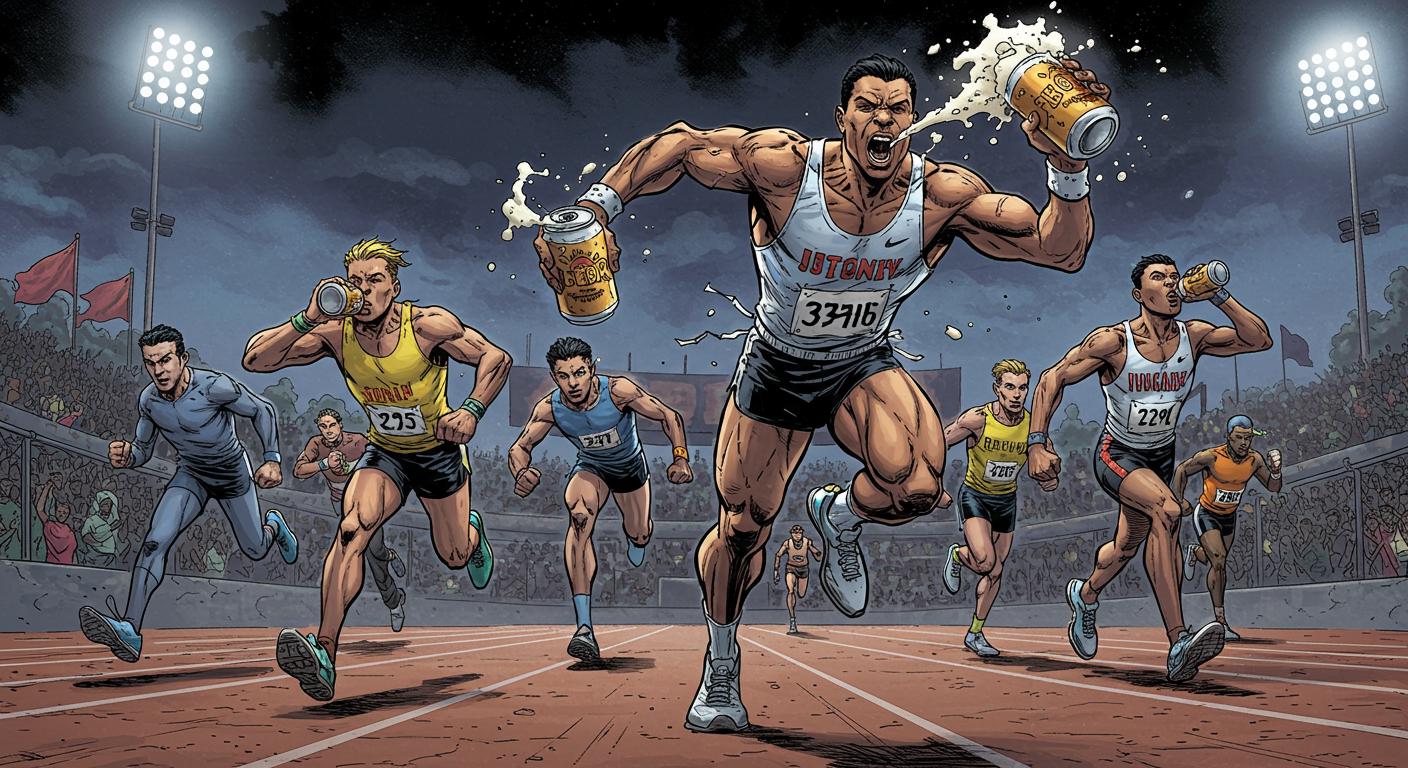If there’s a thesis to modern athletic competition, it’s probably something you’d find emblazoned in bold across a stadium: faster, higher, stronger. But there’s a relatively under-appreciated corner of the sporting world where the real motto is simply: don’t puke on the backstretch. Enter the beer mile—a heady fusion of performance running, competitive drinking, and, apparently, unsinkable Canadian grit.
The Corey Bellemore Phenomenon
As outlined in The Guardian’s profile of Corey Bellemore, the reigning champion of the Beer Mile World Classic, Bellemore has quietly amassed a level of dominance that borders on the surreal. Five wins in a row at the sport’s chief international event? Most established sports can’t claim such unbroken reign. Yet, unlike other headline-generating champions, Bellemore seems more likely to be met with knowing chuckles than lucrative endorsement deals.
The beer mile itself is, on paper, disarmingly simple: competitors must run a mile, drinking a full beer before each lap of the 400m track—four laps, four drinks. Each beverage must be at least 355ml and 5% ABV. And, as Beermile.com delightfully notes, it’s “equal parts gastric challenge and athletic endeavor.” The Guardian further clarifies that if a participant loses their lunch, they’re punished with an extra lap—a rule that inserts just the right amount of chaos into the proceedings. Within this strange crucible, Corey Bellemore has proven to be the master alchemist.
Unlikely Origins, Unmatched Dominance
The Guardian documents that Bellemore’s path to the world stage was almost accidental. Rather than meticulously training for the beer mile since childhood, Bellemore stumbled into it: a post-practice trial run, with his twin brother acting as timekeeper and a friend as cameraman, led to him unofficially breaking the world record on his first attempt. Only a day later, he was recruited for the Beer Mile World Classic in London, England. Despite his inexperience and the effects of jet lag, he walked away with the title—a detail underscoring his uncanny knack for the event.
Anecdotes from Bellemore himself, as shared in The Guardian, reveal that his talent for rapid consumption predates any love for beer. “From a young age – and this is not beer related – if I had to consume a bunch of liquid after running practice, I could finish the entire water bottle in a very short time. Electrolyte mix, Gatorade, whatever it was, I could down it as quick as I needed to get it in.” In a sense, his future as the beer mile’s Michael Phelps was lurking in the fine print of elementary hydration.
Bellemore has gone on to set mind-bending benchmarks. The Guardian notes that at the Beer Mile World Classic in Portugal in late July, Bellemore broke his own world record, finishing in four minutes 27.1 seconds. To put that in perspective, the fastest recorded mile—ever—is 3:43.13, achieved by Hicham El Guerrouj, who presumably ran entirely beer-free. In a sport with an inherent handicap, Bellemore makes the extraordinary seem almost routine.
Triumph, Mishap, and Reluctant Celebrity
As described by The Guardian, Bellemore’s career hasn’t lacked for drama or mishap. The 2023 World Classic, for example, featured the sort of detail sports archivists cherish: Bellemore’s shoe came off within the race’s opening yards, but he charged on (one-shoed, unfazed), ultimately securing the title regardless. The same report highlights that he holds records not just for the standard event, but also for canned beers and in the non-alcoholic category, proving his supremacy is ingredient-agnostic.
Despite—or perhaps because of—the spectacle, Bellemore downplays the party image. In a candid moment recorded by The Guardian, he addresses public misconception: “I think a lot of people get a misrepresentation of who I am, of what I’m about, what I do. I think a lot of people think maybe I’m a booze bag, maybe a bad influence because I’m doing these races.” The article details how he only competes once or twice a year, focusing most of his training on the running, and is about to launch a professional triathlon career—a gentle reminder that athleticism, not amateur hour, drives his success.
The Guardian also chronicles the heartbreak and resilience: after a controversial loss in 2018, when he was ruled not to have finished all his beer, Bellemore rebounded to reclaim and extend his streak, stacking up five consecutive championships. Clearly, he isn’t simply outlasting the competition—he’s rewriting the expectations for what’s possible in a sport many still dismiss as a collegiate novelty.
Reflections on Novelty, Endurance, and Human Oddity
There’s an oddly compelling dignity to Bellemore’s rise—a champion who’d rather blend into the starting line than celebrate at the finish. Reflecting on the details The Guardian offers, his story feels less like a punchline and more like a case study on adaptation and focus. He’s at the very top of a global oddity, a man who turns a sport most see as a stunt into a showcase for precision, pacing, and a spectacularly resilient digestive system.
Events like the beer mile—alongside classics such as bog snorkelling or chess boxing—occupy the fertile realm where the absurd and the admirable collide. They’re reminders that the boundaries of sport are always up for debate, that new legends can emerge in the most unexpected of arenas. And as Bellemore continues to collect titles, one wonders: with each chug and sprint, does victory taste any sweeter, or just a little more surreal?
It’s tempting to imagine a future where the annals of athletic greatness routinely make room for the lords of the athletic fringe, and where we all ask ourselves, with a smile: if “I could chug from a young age,” would greatness have found me at the bottom of an empty pint, too?







